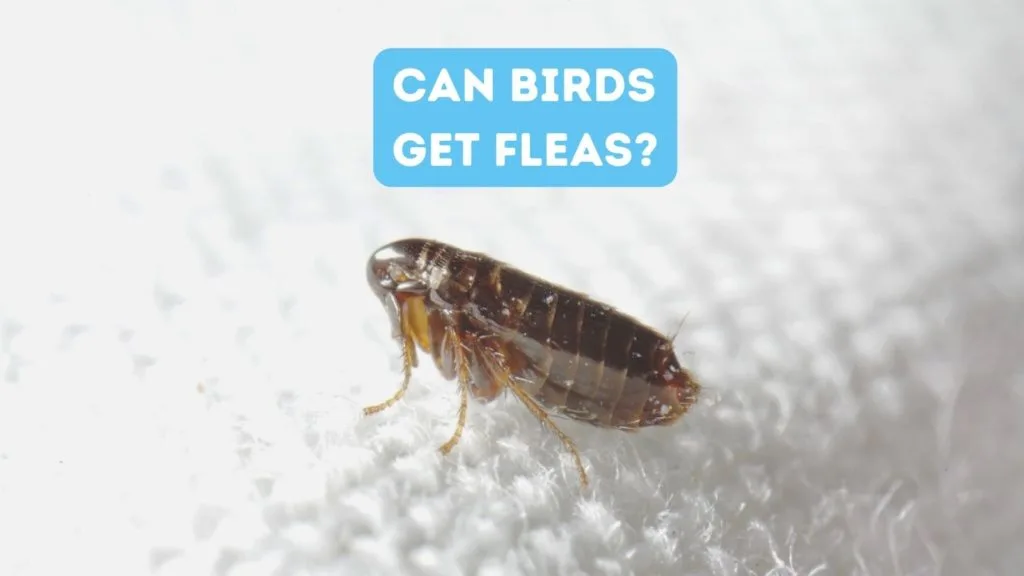When we think of fleas, our minds often jump to household pets like dogs and cats. But, yes, birds can get fleas as well. These tiny, wingless parasites can infest a variety of bird species, causing discomfort and, in severe cases, health issues. But when you see a bird scratching, is it always due to fleas?

The Avian Flea: A Specialized Parasite
Bird fleas, such as the species Ceratophyllus gallinae (seen above) or often called the European chicken flea, are adapted specifically to living on and feeding off birds.
Unlike the fleas that typically infest mammals, bird fleas have evolved to thrive in the unique environment of feathers and avian skin. These parasites can cause irritation and discomfort to their hosts, leading to the scratching behavior often observed in infested birds.
Symptoms of Flea Infestation in Birds
Birds infested with fleas may exhibit several signs, including:
- Excessive scratching or preening: While birds naturally preen their feathers, an infested bird may do so more vigorously or obsessively due to irritation.
- Feather damage or loss: Persistent scratching and preening can lead to noticeable damage to feathers or even bald patches.
- Restlessness: The discomfort caused by flea bites can make infested birds appear more restless or agitated than usual.
- Reduced overall condition: In severe cases, a heavy flea infestation can lead to a decline in a bird’s overall health condition, potentially affecting its ability to fly or forage effectively.
Which Birds Are Most Likely to Get Fleas?
Wild birds, particularly those nesting or roosting in close quarters, are most susceptible to flea infestations. The close proximity of nesting birds provides an ideal environment for fleas to spread from one individual to another.
Species that build communal nests or roost together in large numbers, such as sparrows, swallows, and starlings, are among those most at risk.
However, it’s not only wild birds that can get fleas. Domesticated birds, including chickens and pet birds, can also become hosts to these parasites. In these cases, the infestation is often linked to contact with wild birds or the presence of fleas in the surrounding environment.
Fleas vs. Other Parasites
It’s important to note that not all scratching in birds is due to fleas. Birds can be afflicted by a range of external parasites, including mites and lice, which can cause similar symptoms. Accurate identification of the specific parasite is crucial for effective treatment.
Treatment and Prevention
For pet birds, flea infestations can often be treated with topical or environmental insecticides designed specifically for avian use. It’s important to consult with a veterinarian before applying any treatment to ensure its safety and effectiveness.
For poultry and wild birds, managing the environment to reduce the risk of flea infestation is key. This can include regular cleaning of nesting boxes.
Can We Get Fleas from Birds? Can Dogs?
Chicken fleas, specifically the species Echidnophaga gallinacea, also referred to as sticktight fleas, are primarily parasites of poultry and birds but can also affect other animals, including dogs, and potentially humans.
These fleas are known for their behavior of embedding their heads into the skin of their hosts, leading to irritation, discomfort, and sometimes secondary infections.
Chicken fleas can spread to dogs, especially if dogs have access to areas where infested chickens or other birds live or roam. While these fleas prefer birds as their hosts, they can and will feed on other animals if given the opportunity. The fleas can attach to the dog’s ears, neck, and other areas, causing irritation and discomfort.
Humans are not the preferred hosts for chicken fleas, but these fleas can bite humans, especially in situations where humans are handling infested animals or are in close contact with infested living spaces. The bites typically result in small, itchy spots that can be uncomfortable but are usually not serious.
More Posts You Might Like
- 8 Letter Bird Names - August 14, 2024
- 7 Letter Bird Names - August 14, 2024
- 7 Birds Named After Famous People - July 23, 2024
